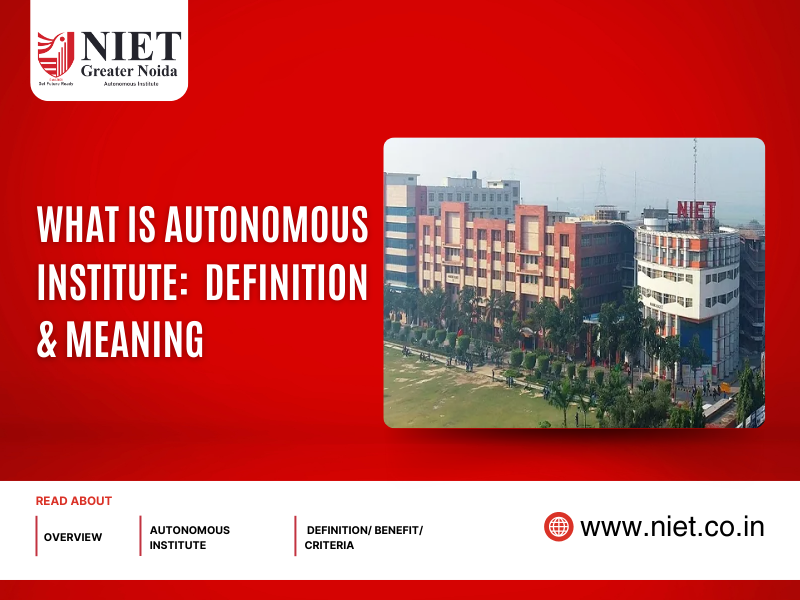Introduction
In the modern world, where research and education are advancing at a rapid pace, there is an increasing need for high-quality education. The phrase “autonomous institute” is becoming more and more commonplace every day. Being independent from external control entails having the capacity for self-regulation and authority. The Autonomous Institute works hard to give its students the best education possible.
The Autonomous Institute brings value to research and academic aspects. The autonomous college list is very vast. There are around 252+ autonomous colleges in India. One in the autonomous college list is NIET, an autonomous college that provides many courses such as B.TECH, PGDM, MBA, MCA, BBA, BCA, B.PHARMA, and BBA+MBA Integrated to provide and impart knowledge in these renowned courses.NIET is the best autonomous college in engineering in India. The private or government-autonomous college in engineering is stated based on its accreditation and affiliation.
Definition of Autonomous Institute
Autonomous Institutes are not like traditional universities. To deliver high-quality instruction and conduct cutting-edge research, autonomous institutes are granted complete autonomy and independent authority over all aspects of their daily operations, including fees, regulations, and courses. Autonomous institutes possess the liberty to make judgments and employ departmental expertise at will.
An autonomous institute is a kind of institution that can design its curriculum, develop its own admissions policies, frame its exams, conduct evaluations, set its fees, and handle admissions. Stated differently, an autonomous institute possesses the authority to execute and enforce complete autonomy over its daily activities or procedures.
These independent institutions are not required to adhere to the government-recommended curriculum. Unlike state universities, which are fully managed and funded by the government, autonomous institutes do not submit their scoresheets to a “board” or other regulatory authority. This includes both the independent admissions procedure and the individual exam schedule.
Benefits of Autonomous Institute
The general development of an institution and the career of its students are significantly influenced by the caliber of its faculty and facilities, which include excellent instruction, labs, and classrooms. Because they have self-governing authority, autonomous institutes are flexible in how they create, deliver, and evaluate their curricula and typically incorporate the most recent research methods. These educational institutions use autonomy to improve the growth of their students.
- One advantage of an autonomous college is its freedom to determine what is best for its students and the institution as a whole.
- The syllabus is maintained based on the course requirements. Certain issues are not covered needlessly.
- Independent educational institutions conduct their exams and create their own set of questions and grading guidelines.
- Compared to traditional colleges, an autonomous college can handle internal exams more easily. since they are in total control of the format of the exam.
- Compared to other universities, the caliber of the lab equipment and facilities is higher.
- Institutes with autonomy can adjust to shifting student demands and offer pertinent instruction to raise the standard of instruction.
- Compared to other universities, the caliber of the lab equipment and facilities is higher.
- Autonomous institutes can adapt to the change in educational needs, and provide relevant education to enhance the quality of education.
- Generally speaking, autonomous institutions provide exam results a month following the test, and failing students will be retested right away.
Criteria for Autonomous Institute
First and foremost, only reputable institutions with superior academic standing are granted autonomy, which is why students there are thought to receive higher-quality education. A strong institutional identity and mission can also be fostered by having the self-governing capacity to improve autonomy. Common requirements for an autonomous institute included, for example :
- Good Infrastructure
An autonomous institution has the infrastructure needed to support innovative research, administration, and the teaching process. These independent schools feature first-rate resources like labs, libraries, classrooms, professors, etc.
- Academic excellence
Colleges with a high degree of autonomy have a more responsible and accountable culture. Autonomous educational institutions offer high-quality education to pupils through their moral and verified academic achievement records, which include high pass rates and superior instruction. Their autonomy and adaptability allow them to take tremendous responsibility for the judgments they make in the administrative and academic spheres.
- Governance and Administration
Autonomous institutions benefit from all forms of certification and excellent rankings, including NIRF, NBA, NAAC, and others. The NIRF shows that autonomy can be persuasively used to improve college performance in India. The NIRF ranking provides information on the beneficial effects of autonomy on institutional efficacy and academic excellence. Strong governance and leadership structures are brought to institutions by self-governing authority.
- Curriculum and Innovation
Autonomous institutions can modify their curricula to accommodate changing industry and student demands. The curriculum’s creative, current design has the potential to inspire novel approaches to instruction. College autonomy is necessary to foster innovation and improve institutional quality.
- Student Support Services
Supportive services for students are available at autonomous institutes, including career counseling, extracurricular activities, career guidance, and partnerships with other educational institutions to advance student
Conclusion
Autonomous Institutes have self-governing authority and self-supporting criteria. Autonomous institutes can set up their administrative bodies and councils to formulate new courses and syllabi. They can prescribe the fees of courses at their level. Autonomous institutes are affiliated with government Universities. An autonomous institute is free to adapt to society’s changing requirements and expectations.
Also Read About:
Top 5 Btech Colleges in Delhi NCR


















